
On 7 December, 2021, the 9th China SIF Annual Conference theming on "Harmonization and Uniqueness of ESG Investing" was held in Beijing.The event was hosted by SynTao Green Finance and Sina Finance; and co-hosted by UNEP FI (United Nations Environment Programme Finance Initiative and UN SSEi (United Nations Sustainable Stock Exchange Initiative). Policymakers, standard setters, asset owners, asset managers, financial intermediaries as well as corporate and academic representatives from home and abroad exchanged their views and shared their insights on the latest ESG development topics.
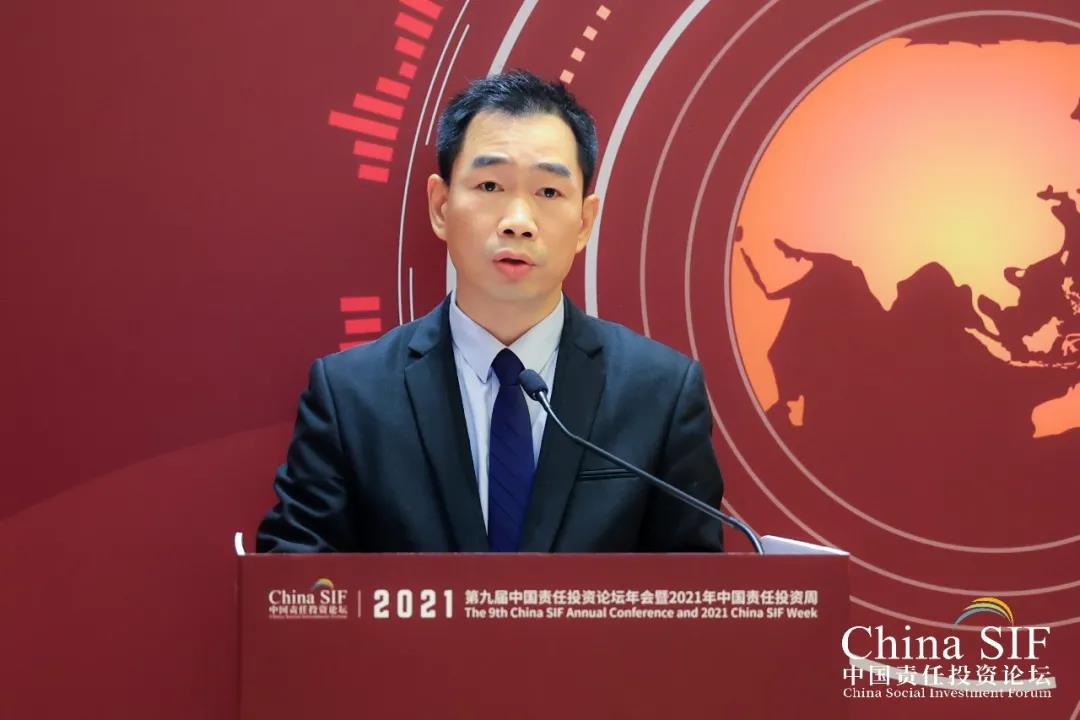
Dr. Guo Peiyuan, Chairman of China SIF and SynTao Green Finance, and Deng Qingxu, CEO of Sina Finance, gave opening remarks. Dr. Guo explained the rationale behind the "Harmonization and Uniqueness of ESG Investing". The development of ESG and green finance, is inseparable from international cooperation and common standards; at the same time, it should be recognized that the development path of ESG and green finance varies in different countries due to the different stages of economic development and national contexts. Mr. Deng Qingxu pointed out that ESG practice is a significant trend driven by the continuing warning brought about by the climate crisis, national policy guidance and investor concern, and suggested the establishment of an ESG rating system suitable for the characteristics of China to help achieve the sustainability objectives of the Chinese economy.
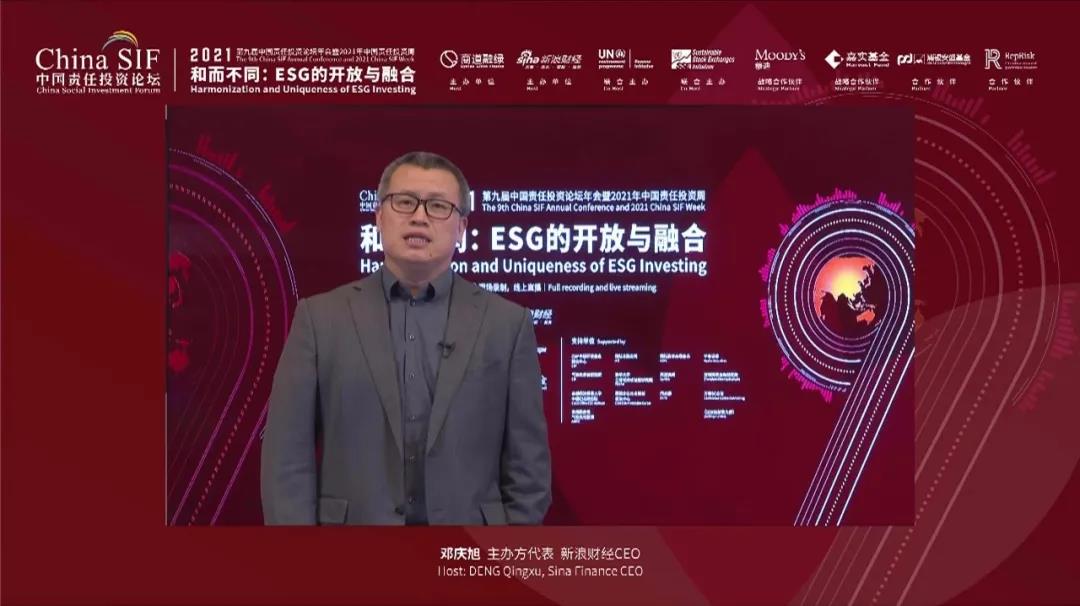
In the keynote speech on policy perspectives, Mr. Eric Usher, Head of UNEP FI, reviewed the positive actions of the financial sector in the areas of climate change, biodiversity and other sustainable development issues before and after COP26. He appreciated China's support for global sustainable development and the active commitment of Chinese financial institutions in signing international commitments such as the Principles for Responsible Banking (PRB) and the Principles for Sustainable Insurance (PSI).
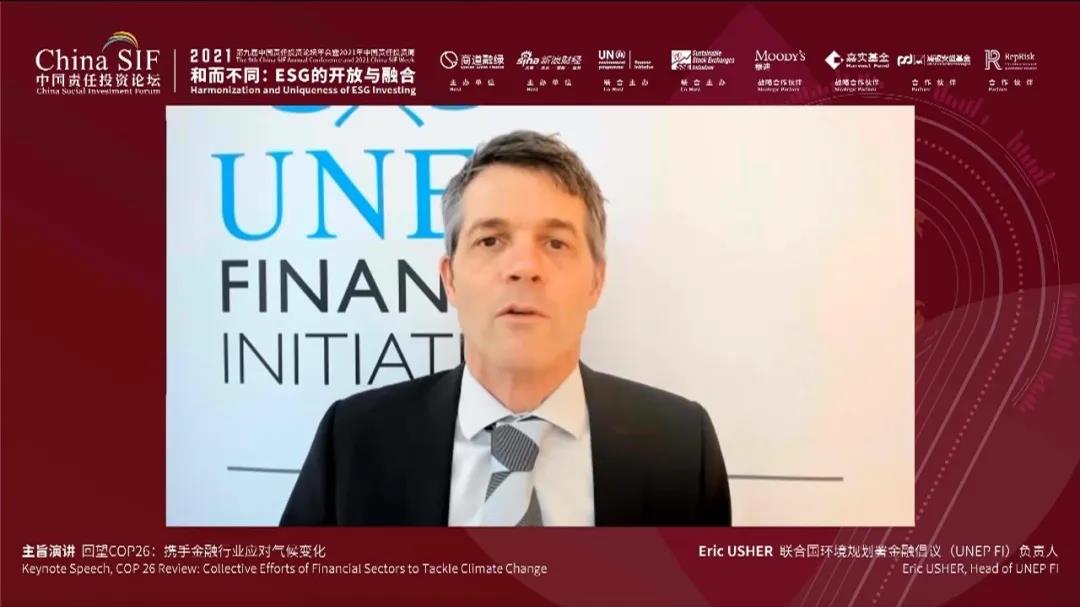
Mr. Wang Zhongmin, former Vice Chairman of the National Council of Social Security Fund and Honorary Chairman of China SIF, pointed out that the development of "dual-carbon" goals and ESG investment is moving towards “harmonic diversity”. "After forming a cognitive consensus, it is necessary to align the behaviours of microeconomic entities with macroeconomic objectives, and align financial, industrial and social objectives, so as to form a synergy and achieve low-carbon objectives in market-based ways.
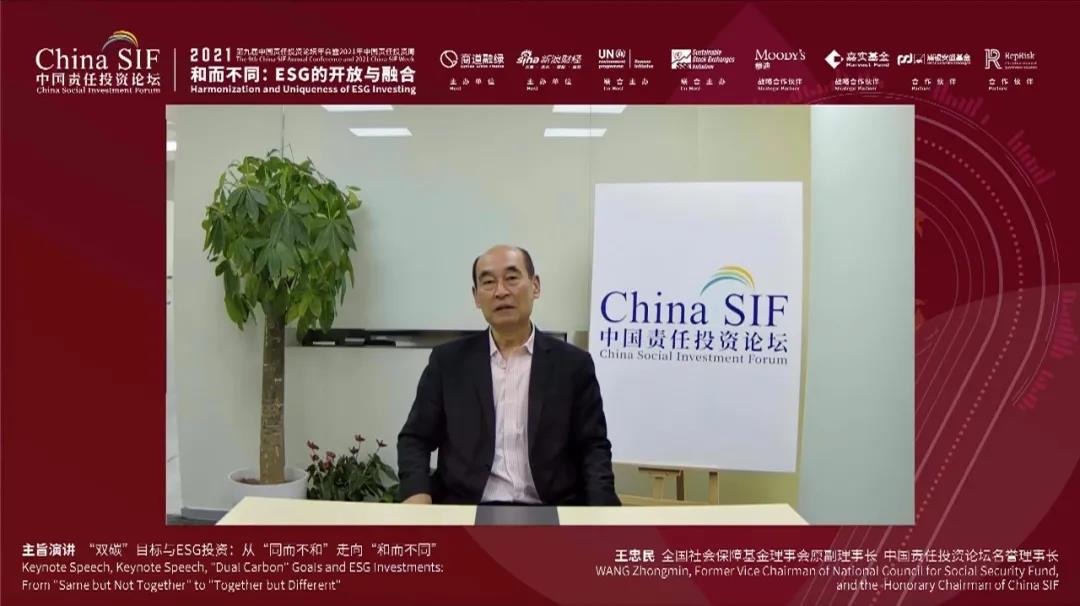
Dr. Ma Jun, Chairman of the Green Finance Committee of China Society for Finance and Banking (GFC) and Director of Beijing Institute of Green Finance and Sustainable Development, introduced the latest developments in green finance at home and abroad. He particularly elaborated on global cooperation and standards convergence in green finance. He pointed out that the consensus reached by countries in the G20 roadmap for sustainable finance development had three focal points: firstly, promoting comparability, compatibility and consistency of sustainable finance standards; secondly, supporting the newly established International Sustainability Standards Board (ISSB) to develop globally harmonized sustainability disclosure requirements; and thirdly, promoting the development of a framework for the transition finance. He stressed that sustainable finance is not just about environmental improvement. Climate change actions, biodiversity and other issues will become the focus of international attention one after another.

Mr. Wang Yida, Chairman of the Supervisory Committee of National Green Development Fund, affirmed that carbon peaking and carbon neutrality would bring tremendous green investment opportunities to China. At the same time, green finance should also fulfil its role in terms of resource allocation, price discovery and ESG risk management to help achieve the "dual-carbon" goals. The National Green Development Fund will leverage its diversified shareholder structure, direct investments and regional advantages to drive green investment and support the realization of the "dual-carbon" goals.

Ms. Wang Ying, Member of the Party Group of Beijing Local Financial Supervision Administration and Deputy Director General, introduced Beijing's policy progress of promoting green finance development, saying that the Beijing has included green finance into the key tasks of the "two regions" construction plan, and filed an application, as one of the first municipalities, to become the pilot zone for national green finance reform and innovation. The next step will be to build an international center for green finance by upgrading green finance policies and mechanisms, promoting the development of green finance standards, gathering green finance market resources and enriching the supply of green finance products and services.

Mr. Jonathan BRAVO, Head of Finance, IT and Senior Policy Advisor at the International Organization of Securities Commissions (IOSCO) Secretariat, shared the focus of IOSCO's work as a global securities industry standard-setter in promoting sustainable capital markets, including improving the availability of information and data related to sustainable finance. In the coming future, IOSCO will evaluate ISSB's sustainability reporting standard, in particular, whether this standard meets the needs of capital markets and investors.

Dr. Guo Peiyuan then moderated a panel discussion from the policy perspective on "Harmonization of ESG Policies". Ms. Yuki Yasui, Regional Coordinator of Asia Pacific at the UNEP FI, said that the focus of UNEP FI's work is shifting from risk management to seizing opportunities, hoping to drive more positive impacts by financial institutions. Ms. Han Ning, Director of Market Innovation Department of the National Association of Financial Market Institutional Investors (NAFMII), introduced the innovations in bond products this year, including carbon neutrality bonds, sustainability-linked bonds and social responsibility bonds. She said that since the introduction of the "dual-carbon" goals, green bonds have received continuous attention from investors and issuers. To date, the issuance size of green debt instruments under NAFMII's supervision is nearly RMB 300 billion, more than five times higher than that of last year. The NAFMII who chairs the Green Bond Standards Committee, will work together with its members to publish the Green Bond Principles. It will also accelerate the work of green bond third-party veritification scheme in the future and attract more investors, among other things, by enhancing information disclosure as well as making investors known to the public. Dr. Lin Wei, Economic Advisor to the District Major of Tongzhou District in Beijing, who is a government-hired specialized expert, shed light on the supporting policies on green finance in the Opinions of the State Council on Supporting the High-Quality Development of Beijing's Sub-city Center, introduced the progress of Beijing's sub-Center in building an international center for green finance in the past year, and shared future plans in building a whole industrial chain of green finance, exploring the development of green finance standards, promoting cross-border carbon trading. Dr. An Guojun, Deputy Secretary-General of the Green Finance Committee of China Society for Finance and Banking (GFC) and Vice Chairman of China SIF, talked about the policy coordination between different ministries and between central and local governments in promoting green finance development in the past year, as well as the innovation of instruments such as government-led green low-carbon funds, carbon-neutral funds and municipal green bonds, pointing out that green finance and responsible investment require top-down promotion and bottom-up implementation, and the need for a synergy of diverse green investors.
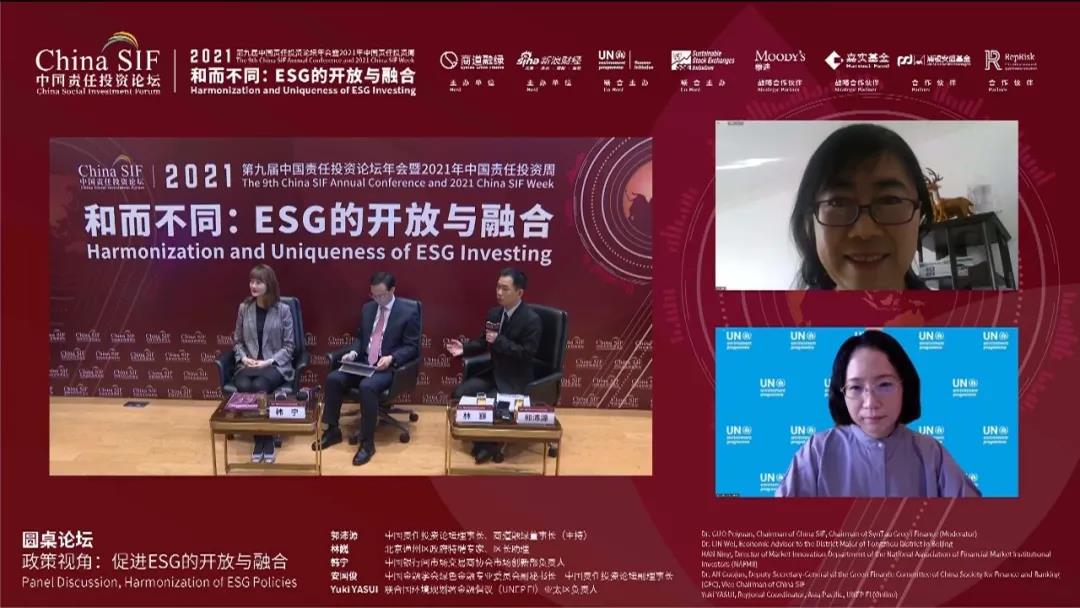
The annual conference released a series of reports, including the China Sustainable Investment Review 2021, Keep Moving: An Overview of China A-Share ESG Performance 2021, and ESG Assessment for Local Governments in China. Mr. Zhang Rui, Managing Director of SynTao Green Finance and Director of China SIF, said that the China Sustainable Investment Review 2021 and the Keep Moving: Overview of China A-Share ESG Performance 2021 provide an overview of China's ESG responsible investment market from the perspective of the capital market and listed companies respectively. He pointed out that the overall ESG ratings of A-share listed companies have been steadily improving. Listed companies have responded more quickly in addressing climate change and carbon neutrality. The size of ESG investment has grown significantly, especially in the mutual fund sector, with the total amount of pan-ESG mutual funds exceeding RMB500 billion to date, doubling the amount in 2020. With policy progress, increased investor awareness and discovered investment value, a positive feedback loop is forming and being strengthened for the ESG market.

Prof. Zhu Xufeng, Executive Director of Tsinghua University's Institute for Sustainable Development, introduced the indicator settings and composition of the local government ESG rating indicator system, as well as the ESG rating results of 30 provinces, cities and autonomous regions in China from 2014 to 2018, during the launch of the ESG Assessment for Local Governments in China. The overall results show that the current level of ESG development across the country is improving year by year. However, there are significant disparities between regions, and there is still much room for improvement. Finally, he put forward a series of policy recommendations in seven areas: overall layout, central-local interaction, industrial development, ecological transformation, precise mutual assistance, regional best practice, and awareness promotion.
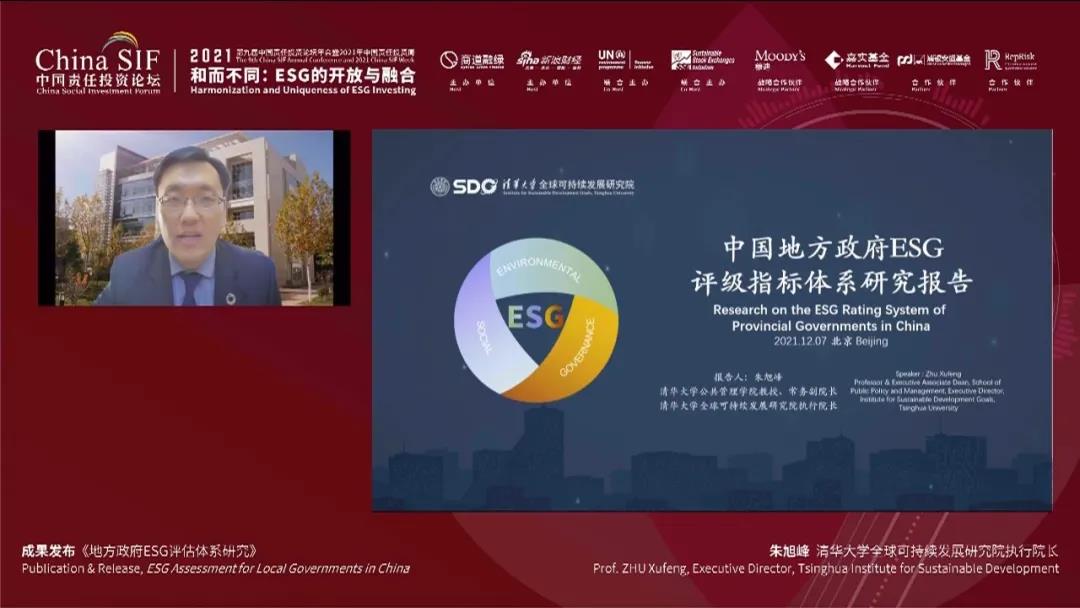
In the keynote speech from the market perspective, Mr. Cao Deyun, Executive Vice President and Secretary-General of the China Insurance Asset Management Association, and Dr. Chen Chunyan, Secretary General of Asset Management Association of China (AMAC), introduced the current status of ESG development in the insurance asset management and fund managment respectively, both saying that ESG is an inevitable requirement for the high-quality economic development. Mr. Cao Deyun pointed out that ESG investment matches the long-term prudent investment style of insurance institutions. At present, insurance institutions have different degrees of practice in incorporating ESG at the levels of strategy, policies & procedures, investment process and product innovation. However, there is still room for improvement in ESG risk management system, governance and organizational structure, information disclosure and data technology. Dr. Chen Chunyan pointed out that ESG investment is aligned with the value-oriented, investment return-driven and risk management needs in the asset management sector. To practice ESG investing requires a series of systems, tools and methods, and data support. The AMAC will strengthen the industry's ESG and "dual-carbon" information disclosure, direct private funds to green investment, promote digitalization, and explore incentive mechanisms in policy formulation.
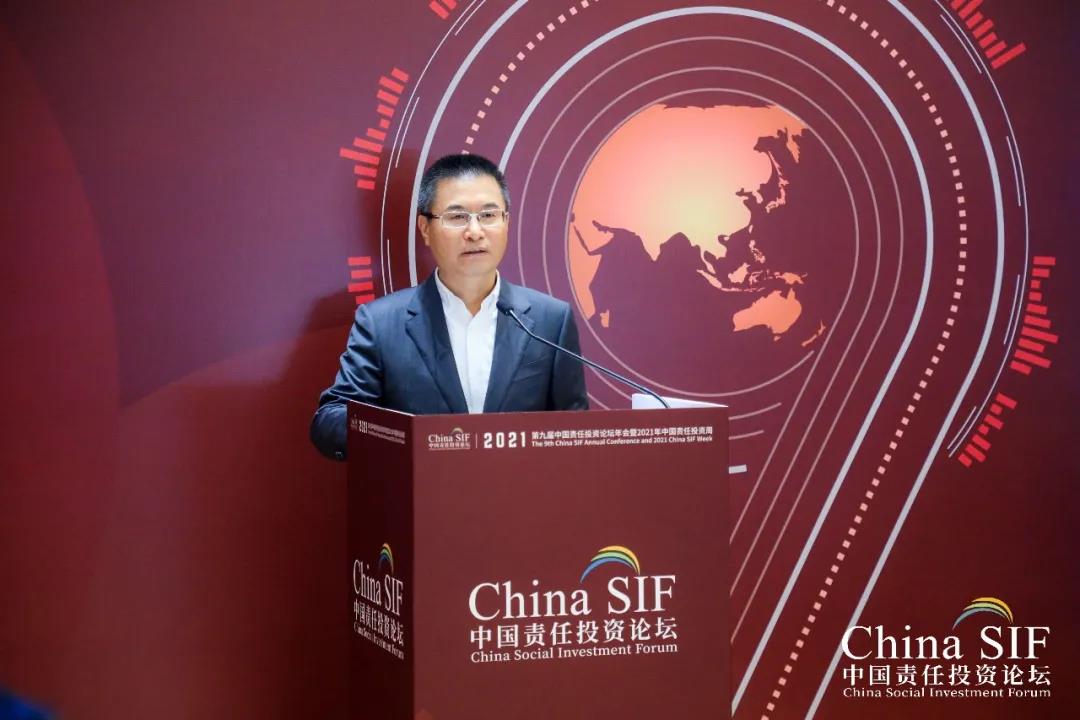

Mr. Thomas Kwan, Chief Executive Officer and Chief Investment Officer at Harvest Global Investments, shared the ESG investment practice under the "dual-carbon" goals from the perspective of a market participant; he believed that ESG should not be limited to thematic investment but rather a concept that should be fully integrated into the whole process of investment management to play the role of reducing risks, seizing opportunities, and identifying good companies and good entrepreneurs.

Mr. Simon O'Connor, Chairman of the Global Sustainable Investment Alliance (GSIA) and CEO of the Australasian Responsible Investment Association (RIAA), shared global trends in ESG assets and ESG standards. While international ESG investments are expanding, reaching US$35 trillion by 2020 and accounting for 36% of global AUM, ESG-related standards are emerging across global markets. He highlighted the importance of standards convergence and consistency across markets and appreciated the efforts of China and Europe in this regard.
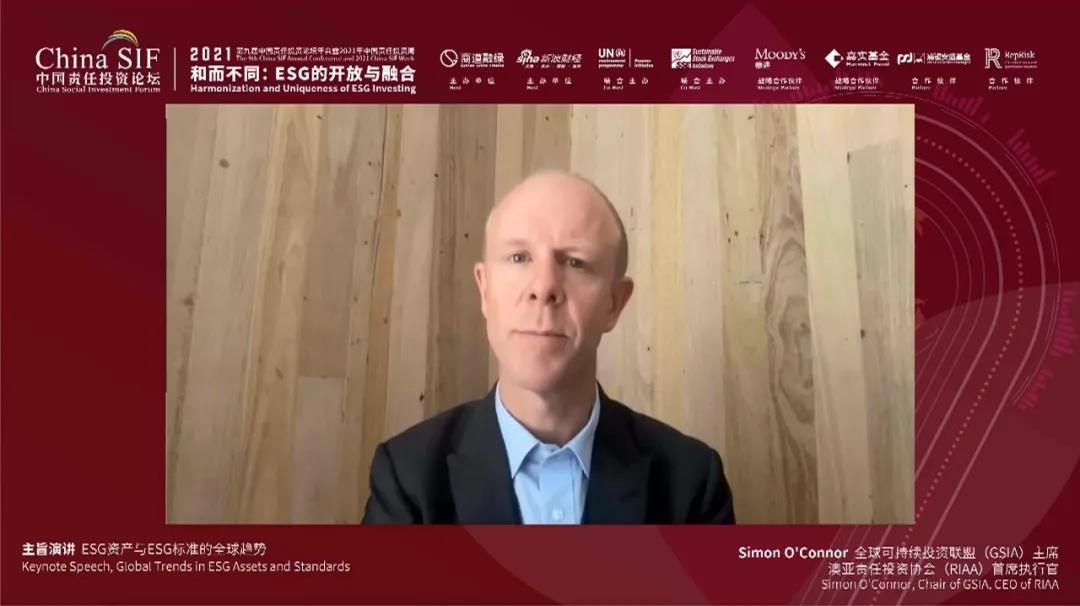
The next panel session was focused on the diversification of ESG investors and ESG products from a market perspective and was moderated by Ms. Grace Guan, Secretary General of China SIF and Deputy General Manager of SynTao Green Finance. Mr. Ricco Zhang, Senior Director of Asia Pacific at International Capital Markets Association (ICMA), said that driven by market demand, the sustainable bond market has developed four types of products: green bonds, social responsibility bonds, sustainable development bonds and sustainability-linked bonds (GSSS bonds). Global GSSS bond issuance is growing rapidly, driven by sustainable recovery and climate goals. He noted that the market places greater demands on issuers' ESG and climate risk management framework and that it is essential to consider environmental elements in transition finance and social responsibility issues related to people who are negatively affected. Mr. Zhang Xiaosong, Managing Director and Head of Chinese Institutional Business from Amundi Hong Kong, shared the global ESG investment dynamics: from a market segment perspective, ESG growth in the global public fund sector is stronger; from a geographic distribution perspective, the number of responsible investors is growing rapidly in both North America and the Asia Pacific, in addition to traditional European investors. He noted that investors have adopted ESG as a longer-term investment objective and ESG has become a must for global institutional investors' dedicated investment guidelines; ESG is moving from a risk control metric to a source of long-term return. From the exchange's perspective, Jon Edwards, Chief Representative of London Stock Exchange Group Beijing Representative Office, shared the market demand for ESG investment products and the current development of related products, suggesting that diversified products and sufficient and reliable data are necessary for ESG investment to prosper and pointing out the role the exchange can play in these two aspects. Mr. Li Feiyue, Senior Vice President of Multi-Asset Investment Department of China Life Asset Management Co., Ltd. shared the ESG practice experience of China Life Asset, pointing out that the biggest challenge for ESG investment in China is still data, and that there will be continuous industry cooperation to explore ESG's roles in quant and index investment.
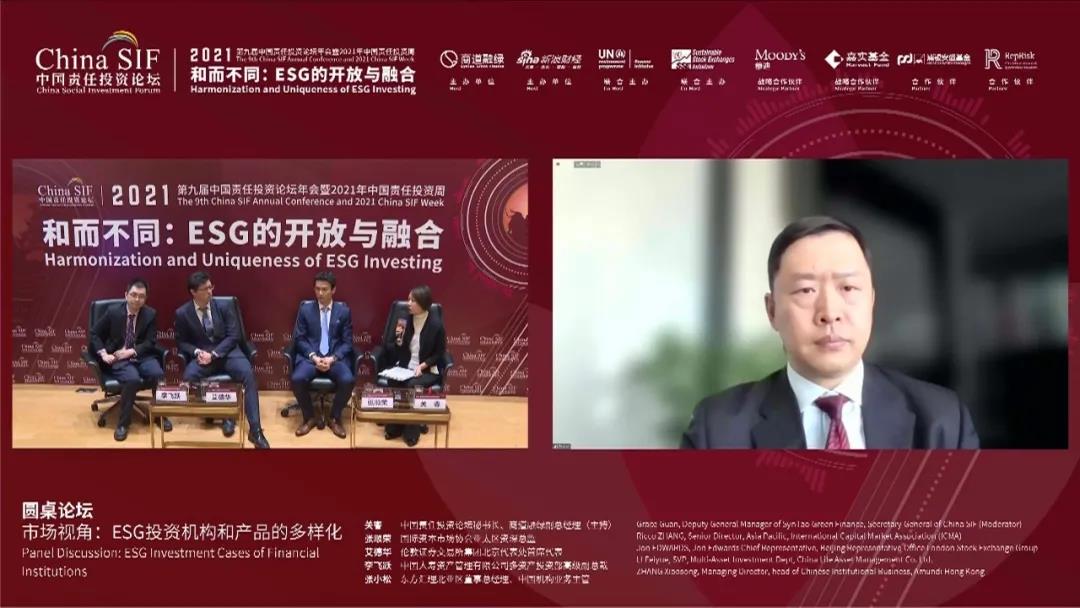
In the afternoon sessions of the Annual Conference, four parallel forums were held feauring "ESG Product Innovation under Carbon Neutrality", "Long-Term Capital to Escort the ESG Development", "Climate/Environmental Information Disclosure for Financial Institutions", and "Investment Stewardship and Investor Relations Management".
The forum "ESG Product Innovation under the Carbon Neutrality" was moderated by Mr. Zhang Rui, Managing Director of SynTao Green Finance and Director of China SIF. Mr. Yang Yuebin, Fund Manager of Equity Investment in AXA SPDB Asset Managers delivered a keynote speech on the guidance of carbon neutrality on investment practice and providing a new perspective for valuation. Ms. Chen Yaqin, Division Chief of Green Finance Department, Head Office of Industrial Bank, introduced the direction of ESG product innovation in China's banking industry in terms of ESG investment strategies and product series. In the panel discussion, Ms. Katherine Han, Head of ESG Research at Harvest Fund Management, Mr. Wang Xitong, Head of ESG Affairs, Everbright Belt and Road Green Fund, Mr. Jerry Li, Partner of PeakVest, Mr. John Wang, Vice President and Senior Analyst of Moody's Investors Service, and Mr. Chen Ji, Executive General Manager of CICC Research Institute, presented the latest trends in carbon neutrality in financial markets, how to incorporate climate change and carbon neutrality analysis in investment analysis. They also touched the topic of the potential challenges of carbon neutrality as well as in the ESG space.
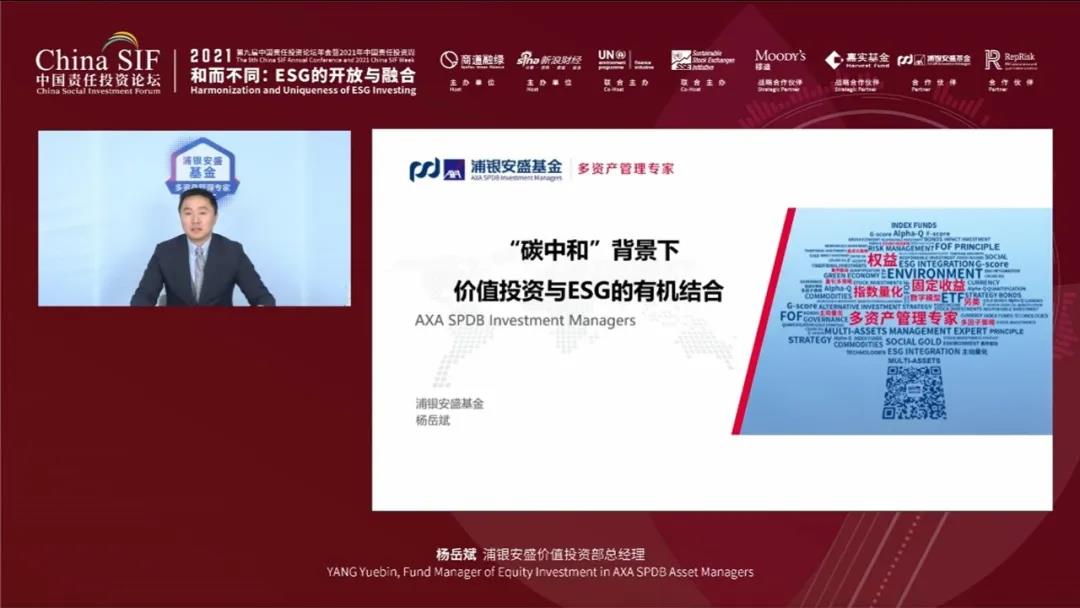


Ms. Grace Guan, Secretary General of China SIF and Deputy General Manager of SynTao Green Finance, moderated the parallel forum on "Long-Term Capital to Escort the ESG Development". Mr. Rex Zhao, General Manager of Fixed Income Investment Department and Head of ESG Investment of Allianz Insurance Capital Management, pointed out that the three dimensions of E, S and G provide good perspectives and factors to pursue stability and sustainability of long-term investment returns. Ms. Lu Dan, Senior Manager of the Information Disclosure Department in the Board Office, China Reinsurance (Group) Corporation, introduced the company's practice in its active ESG investment and information disclosure work in its role of both an asset owner and an asset manager. Ms. Du Jian, Director of Training and International Affairs at IAMAC, Ms Elisabeth Knup, Regional Director and Chief Representative in China for the Ford Foundation Beijing Representative Office, Ms. Kathy Xu, Senior Portfolio Manager of APG, and Mr. Liu Junwei, Executive General Manager of the Research Department of CICC, shared their views on how long-term capital such as insurance funds, pension funds and foundations can incorporate ESG concepts into long-term investment strategies.



Afterwards, Dr. Guo Peiyuan, Chairman of China SIF and SynTao Green Finance, moderated a panel discussion on "Climate (Environmental) Information Disclosure for Financial Institutions". Mr. Nicholas Zhu, Vice President and Senior Credit Officer of Moody's Investors Service, Ms. Yin Hong, Deputy Director of Urban Finance Research Institute of the Industrial and Commercial Bank of China, and Ms. Rebecca Mikura-Wright, Chief Executive Officer of the IGCC and the AIGCC, gave keynote speeches on the value of environmental information disclosure by financial institutions, environmental information disclosure by financial institutions in the context of carbon neutrality, and the framework of guidelines related to climate and environmental information disclosure by financial institutions respectively. Afterwards, Ms. Wang Ting, Senior Manager of the Japan Research Institute (Shanghai) Solution, Mr. Zhang Dachuan, Executive General Manager of the ESG Investment Department at Huaxia Wealth Management, Mr. Alessandra Oglino, Head of Business Development at RepRisk, Mr. Ma Jiangtao, Senior Partner at Dentons Beijing Office, and Dr. Dong Shanning, Assistant General Manager of Corporate Finance with Bank of Jiangsu and Head of the Bank's Green Finance Operation, discussed the difficulties and challenges faced by financial institutions in disclosing environmental information.
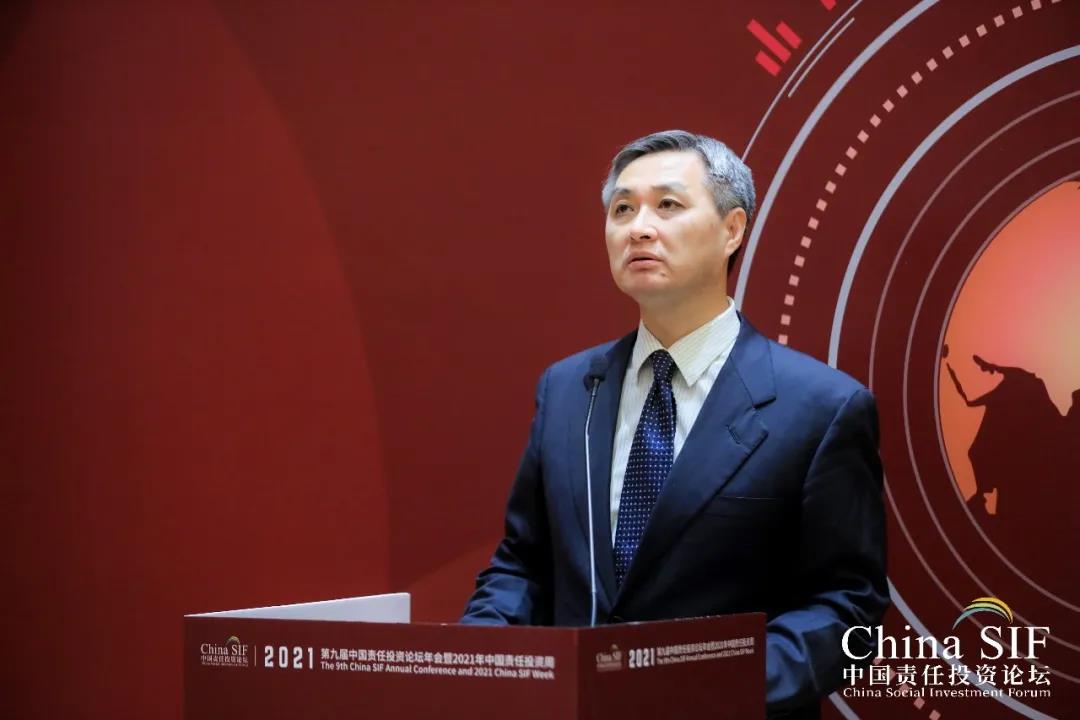
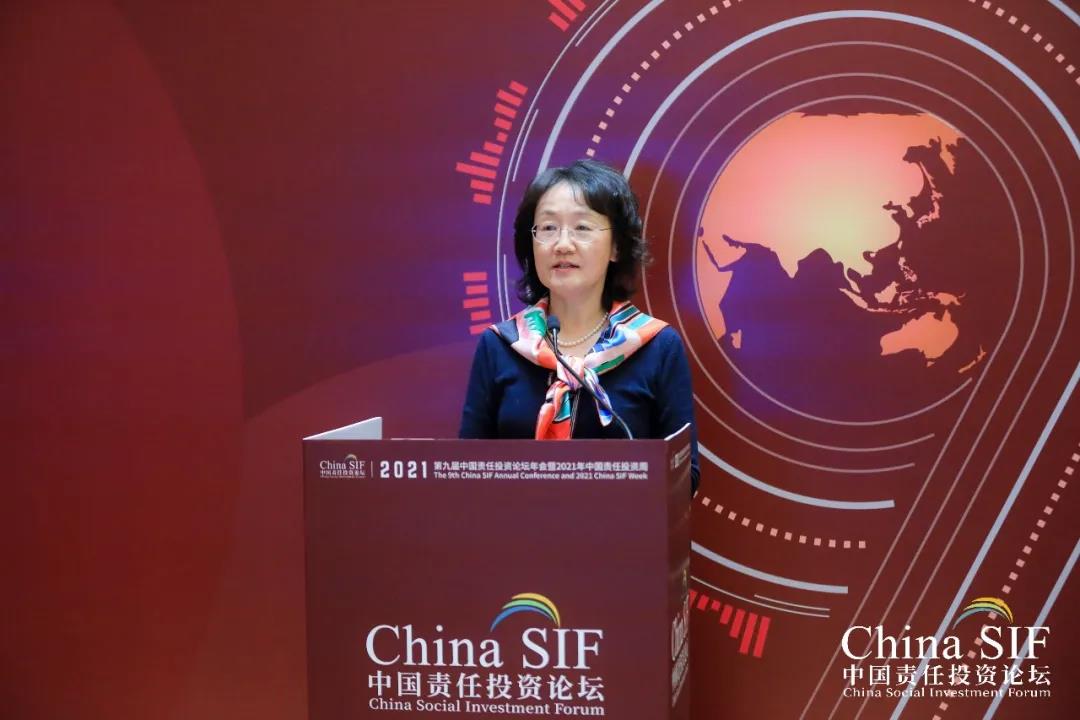
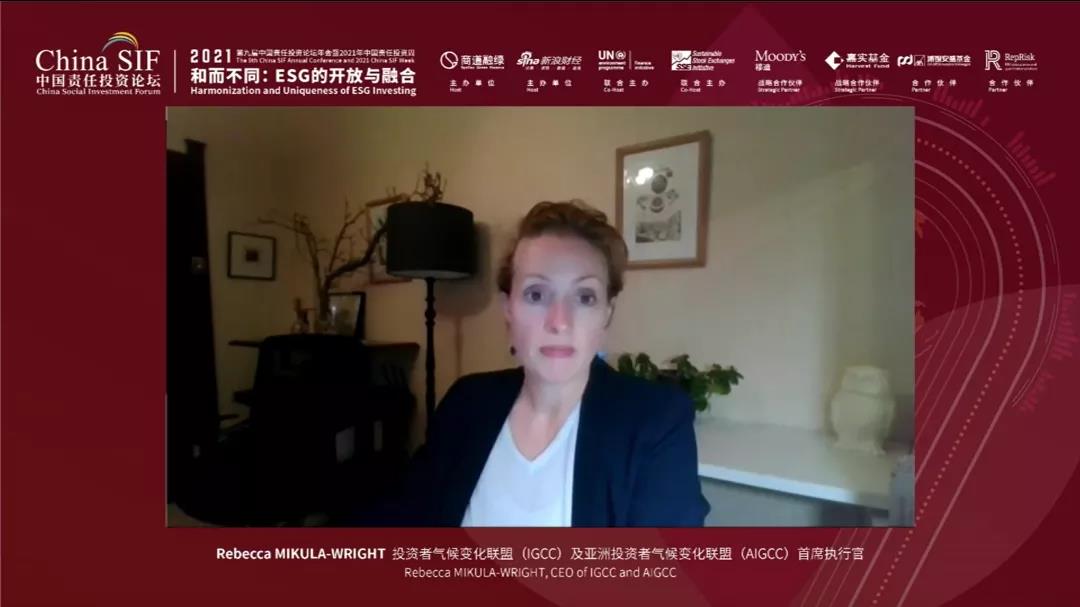
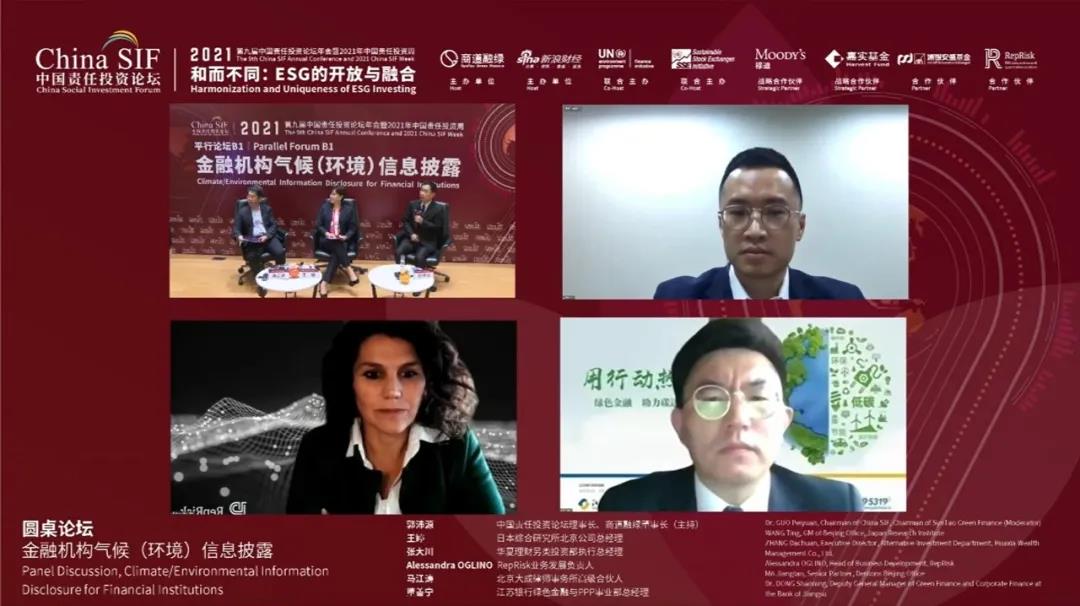
The final session of the conference focused on "Investment Stewardship and Investor Relations Management" and was moderated by the Secretary General of China SIF and Deputy General Manager of SynTao Green Finance, Ms. Grace Guan. Mr. Paul Chandler, Director of Stewardship at PRI, presented the specific requirements for investor stewardship management under the Principles for Responsible Investment. Ms. Yuan Wei, Co-Leader of ESRM Program of International Finance Corporation (IFC) in China, shared IFC's practical experience in stewardship management. Mr. Liu Yanfeng, Deputy Director of the Corporate Governance Department of the China Association for Public Companies, Mr. Li Fei, Associate China Director of CDP, Ms. Fiona Lang, Partner of SynTao, Ms. Flora Wang, Director of Sustainable Investing, Fidelity International, and Ms. Karin Ri, Director of Responsible Investment at Asset Management One International (AMOI), shared their views on stewardship management from both the perspective of investment institutions and listed companies.


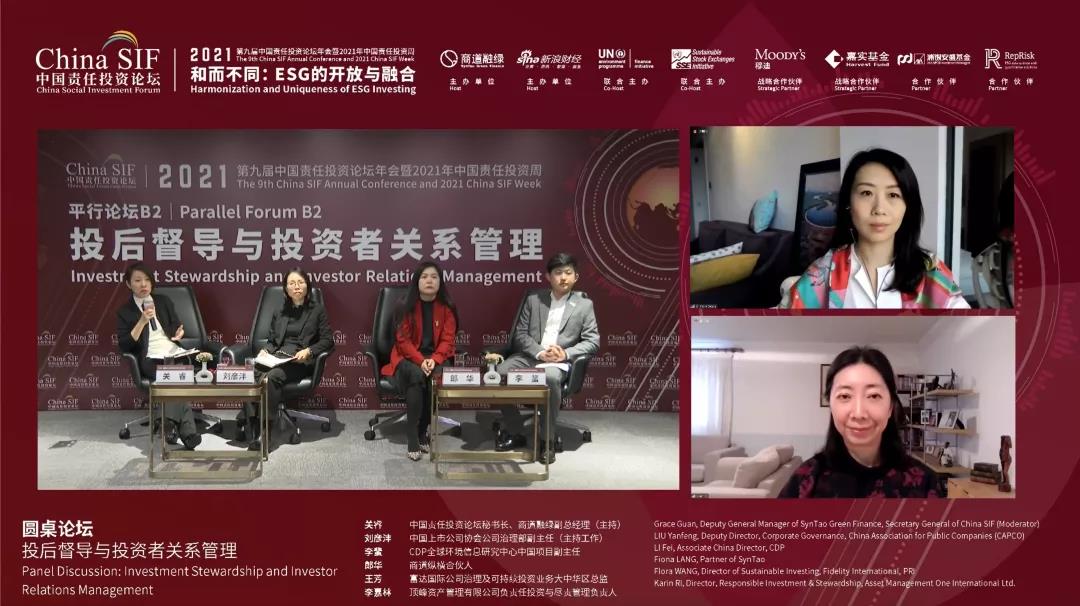
China SIF received supports from Moody's, Harvest Fund, AXA SPDB Investment Managers, and RepRisk in hosting the 9th Annual Conference as well as 2021 China SIF Week. Acknowledgement also goes to CDP, IFC, ICMA, Huatai Securities, CBI, TUSDG, SynTao, Shenzhen Finance Institute, CUEB China ESG Institute, CCM CSR Promotion Center, iFinD, Conference Center Connecting, AIGCC, and UK PACT.
More than 1,800 people registered for the conference and 4,941 people watched the live broadcast on the China SIF official website (https://www.chinasif.org/), with a total viewing time of 100,082 minutes on the day of the event, reaching a record high market influence in terms of number of registrations and live streaming views. More than 1,000 professionals watched the event live via Wind and RoyalFlush. Please visit the China SIF website to watch the event replays.
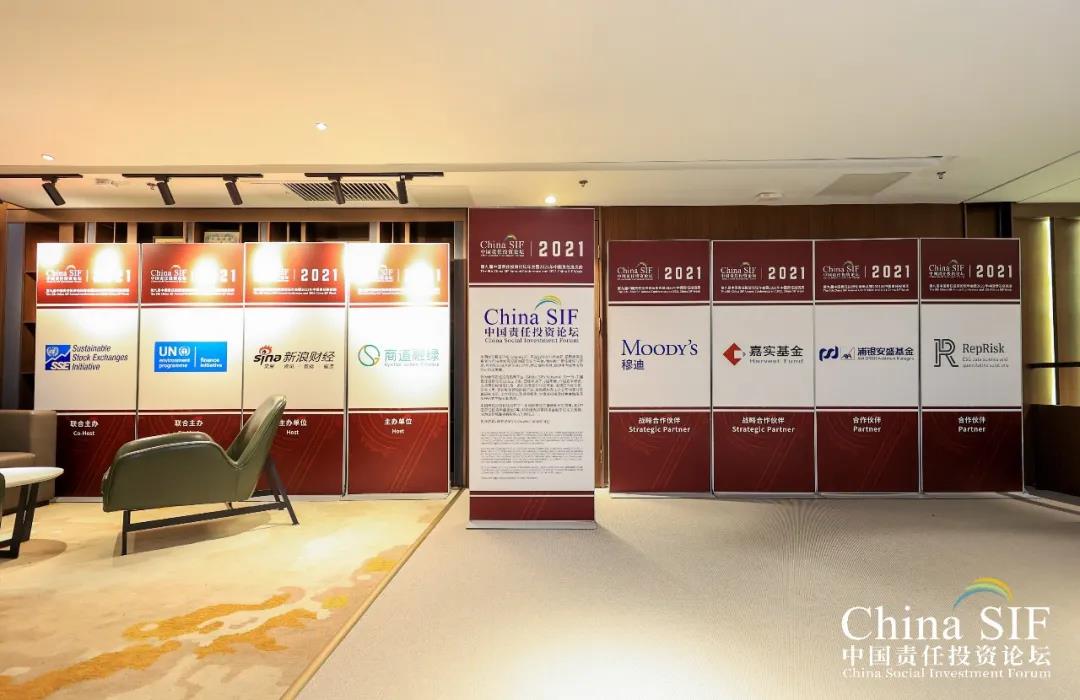
The 9th China SIF Annual Conference is part of China SIF Week 2021, which also includes a series of side events: "Media Training Workshop", "Academy Workshop on ESG and 'Dual Carbon' Goals", "The Green Wave in Fixed Income - The Role of Institutional Investors", "Forest Sustainability and Supply Chain Finance Forum", "Closed-Door Meeting for UNEP FI Members in China", "Sustainable Stock Exchange Roundtable: Financial Instruments Towards Net-Zero Commitment", "Expert Seminar on ESG Disclosure for Chinese Overseas Investment" and "Report Launch of Carbon Capture and Storage for Power and Steel Industry".
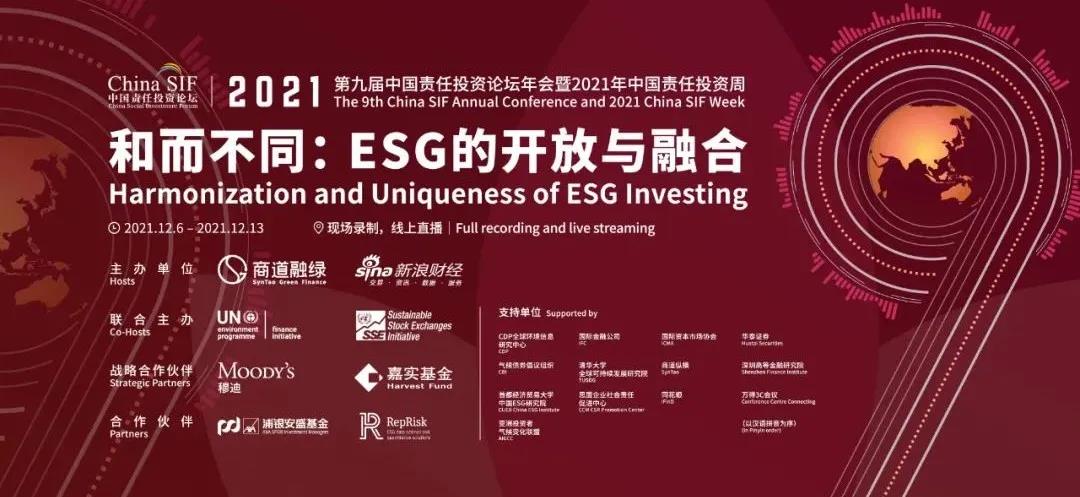
The 9th China SIF Annual Conference
Dec. 7th 2021Beijing 08:45-17:30
Theme: Harmonization and Uniqueness of ESG Investing
Hosts: SynTao Green Finance, Sina Finance
Co-Hosts: United Nations Environment Programme Finance Initiative (UNEP FI), United Nations Sustainable Stock Exchange Initiative (UN SSEi)
Strategic Partners: Moody's, Harvest Fund
Partners: AXA SPDB Investment Managers, RepRisk
Supporters: CDP, IFC, ICMA, Huatai Securities, CBI, TUSDG, SynTao, Shenzhen Finance Institute, CUEB China ESG Institute, CCM CSR Promotion Center, iFinD, Conference Centre Connecting, AIGCC, UK PACT
(in PINYIN order)

